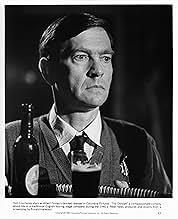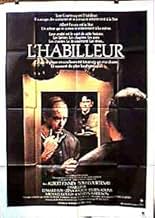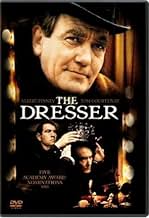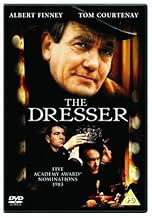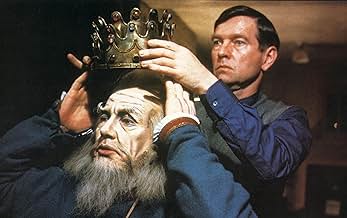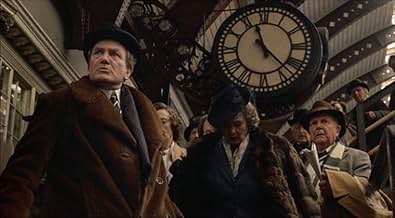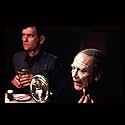Agrega una trama en tu idiomaPersonal assistant Norman struggles to get deteriorating veteran actor Sir through a difficult performance of King Lear.Personal assistant Norman struggles to get deteriorating veteran actor Sir through a difficult performance of King Lear.Personal assistant Norman struggles to get deteriorating veteran actor Sir through a difficult performance of King Lear.
- Nominado a 5 premios Óscar
- 5 premios ganados y 17 nominaciones en total
Anne Blackman
- Beryl
- (as Anne Mannion)
Opiniones destacadas
I just watched The Dresser this evening, having only seen it once before, about a dozen years ago.
It's not a "big" movie, and doesn't try to make a big splash, but my God, the brilliance of the two leads leaves me just about speechless. Albert Finney and Tom Courtenay are nothing less than amazing in this movie.
The Dresser is the story of Sir, an aging Shakespearean actor (Finney), and his dresser Norman (Courtenay), sort of a valet, putting on a production of King Lear during the blitz of London in World War II. These are two men, each dependent upon the other: Sir is almost helpless without the aid of Norman to cajole, wheedle, and bully him into getting onstage for his 227th performance of Lear. And Norman lives his life vicariously through Sir; without Sir to need him, he is nothing, or thinks he is, anyway.
This is a character-driven film; the plot is secondary to the interaction of the characters, and as such, it requires actors of the highest caliber to bring it to life. Finney, only 47 years old, is completely believable as a very old, very sick, petulant, bullying, but brilliant stage actor. He hisses and fumes at his fellow actors even when they're taking their bows! And Courtenay is no less convincing as the mincing dresser, who must sometimes act more as a mother than as a valet to his elderly employer. Employer is really the wrong term to use, though. For although, technically their relationship is that of employer and employee, most of the time Sir and Norman act like nothing so much as an old married couple.
Yes, there are others in the cast of this movie, but there is no question that the true stars are Finney, Courtenay, and the marvelous script by Ronald Harwood. That is not to say that there aren't other fine performances, most notably Eileen Atkins as the long-suffering stage manager Madge. There is a wonderful scene where Sir and Madge talk about old desires, old regrets, and what might have been.
Although it doesn't get talked about these days, it is worth remembering that The Dresser was nominated for five Academy Awards: Best Actor nominations for both Finney and Courtenay, Best Picture, Best Director (Peter Yates), and Best Adapted Screenplay.
I had remembered this as being a good movie, but I wasn't prepared to be as completely mesmerized as I was from beginning to end. If you want to see an example of what great acting is all about, and be hugely entertained all the while, then I encourage you to see The Dresser.
It's not a "big" movie, and doesn't try to make a big splash, but my God, the brilliance of the two leads leaves me just about speechless. Albert Finney and Tom Courtenay are nothing less than amazing in this movie.
The Dresser is the story of Sir, an aging Shakespearean actor (Finney), and his dresser Norman (Courtenay), sort of a valet, putting on a production of King Lear during the blitz of London in World War II. These are two men, each dependent upon the other: Sir is almost helpless without the aid of Norman to cajole, wheedle, and bully him into getting onstage for his 227th performance of Lear. And Norman lives his life vicariously through Sir; without Sir to need him, he is nothing, or thinks he is, anyway.
This is a character-driven film; the plot is secondary to the interaction of the characters, and as such, it requires actors of the highest caliber to bring it to life. Finney, only 47 years old, is completely believable as a very old, very sick, petulant, bullying, but brilliant stage actor. He hisses and fumes at his fellow actors even when they're taking their bows! And Courtenay is no less convincing as the mincing dresser, who must sometimes act more as a mother than as a valet to his elderly employer. Employer is really the wrong term to use, though. For although, technically their relationship is that of employer and employee, most of the time Sir and Norman act like nothing so much as an old married couple.
Yes, there are others in the cast of this movie, but there is no question that the true stars are Finney, Courtenay, and the marvelous script by Ronald Harwood. That is not to say that there aren't other fine performances, most notably Eileen Atkins as the long-suffering stage manager Madge. There is a wonderful scene where Sir and Madge talk about old desires, old regrets, and what might have been.
Although it doesn't get talked about these days, it is worth remembering that The Dresser was nominated for five Academy Awards: Best Actor nominations for both Finney and Courtenay, Best Picture, Best Director (Peter Yates), and Best Adapted Screenplay.
I had remembered this as being a good movie, but I wasn't prepared to be as completely mesmerized as I was from beginning to end. If you want to see an example of what great acting is all about, and be hugely entertained all the while, then I encourage you to see The Dresser.
Adapted by a 1981 Broadway sensation, its film counterpart is a hidden treasure of its time (although it achieved 5 nominations in the Oscar including BEST PICTURE, BEST DIRECTOR, BEST ACTORX2 and BEST ADAPTED SCREENPLAY) but has been rarely mentioned and seen by a younger generation, I have no idea of its existence until recently. I feel kind of cherished to have a chance to watch this UK production since the play-in-a-play structure generally is my cup of tea.
Then it proves that this is an exceedingly diverting film from the late director Peter Yates even though the quintessence of pleasure may lie in Finney and Courtenay's crack two-hander, which is beyond any thespian methods, two utterly gallant performances brilliantly deliver every tiny little nuance and never descend into a stasis of tedious affectation. Theatrical adaption has always been an impeccable showcase for actors. A copybook triumph from both Finney and Courtney. The King Lear play in the film proffers a tour-de-force stage for Finney's expertise and his overpowering sway is both intimidating and entertaining; as for Courtenay, whose character molding even merits more pluck due to the self-challenging devoutness. Which one I prefer, after some contemplative thinking, despite of Finney's pretty fierce endeavor, I will choose Courtenay, a lesser known actor but achieves a more startling reverberation.
Among the supporting roles, Eileen Atkins is managing to steal some flare from two leading players, she is so underrated and should be ranked alongside Maggie Smith, Judi Dench and Helen Mirren, among the most venerated names inside the so-called UK Dame coterie.
The film has set up a perfect mode for the contemporary play-goes-film trend, within some minimal usage of settings, the impact has been magnified in an index level to be seen by a much larger audience. The screenplay is the keystone here, that's why they're emerging in an inexhaustible tide which verifies that theatrical play is an endless fodder-provider for both awards-craving production companies and thespians.
Then it proves that this is an exceedingly diverting film from the late director Peter Yates even though the quintessence of pleasure may lie in Finney and Courtenay's crack two-hander, which is beyond any thespian methods, two utterly gallant performances brilliantly deliver every tiny little nuance and never descend into a stasis of tedious affectation. Theatrical adaption has always been an impeccable showcase for actors. A copybook triumph from both Finney and Courtney. The King Lear play in the film proffers a tour-de-force stage for Finney's expertise and his overpowering sway is both intimidating and entertaining; as for Courtenay, whose character molding even merits more pluck due to the self-challenging devoutness. Which one I prefer, after some contemplative thinking, despite of Finney's pretty fierce endeavor, I will choose Courtenay, a lesser known actor but achieves a more startling reverberation.
Among the supporting roles, Eileen Atkins is managing to steal some flare from two leading players, she is so underrated and should be ranked alongside Maggie Smith, Judi Dench and Helen Mirren, among the most venerated names inside the so-called UK Dame coterie.
The film has set up a perfect mode for the contemporary play-goes-film trend, within some minimal usage of settings, the impact has been magnified in an index level to be seen by a much larger audience. The screenplay is the keystone here, that's why they're emerging in an inexhaustible tide which verifies that theatrical play is an endless fodder-provider for both awards-craving production companies and thespians.
Eloquent performances from Finney and Courtney propel this film adaptation of the Ronald Harwood play about a reclusive old actor barely able to make it on stage and his mother-hen valet. It's a true story of friendship and comradeship. Both performers are brilliant in every scene. Bravo!
'The Dresser' is one of those films which are so perfect you really struggle to find something not to like about them. Written by Ronald Harwood (himself a former dresser to the legendary Donald Wolfit), it sparkles with energy and true love of life behind the footlights.
As 'Sir', the overbearing actor and main focus of the play, Albert Finney is a joy to watch - whether complaining about the lack of a storm during the 'blow, winds ...' bit of 'King Lear' or chatting to his faithful stage manager, Madge (Eileen Atkins, good as ever) about the old times. As Norman, his camp dresser, Tom Courtenay gives a fabulous performance, wiggling around at the beck and call of 'Lear', collecting a bottle to go at the pub, or bitchily disparaging the former Fool, Mr Davenport-Scott (often mentioned, but never seen!).
In an engaging support cast, there's Edward Fox as Oxenby (a typical arrogant second lead), Zena Walker as her Ladyship, Lockwood West as the replacement Fool, and many others.
This film has great energy, bringing with it some of the greasepaint of its stage origins, it is true, but being so well-acted you don't notice. Very well done indeed.
As 'Sir', the overbearing actor and main focus of the play, Albert Finney is a joy to watch - whether complaining about the lack of a storm during the 'blow, winds ...' bit of 'King Lear' or chatting to his faithful stage manager, Madge (Eileen Atkins, good as ever) about the old times. As Norman, his camp dresser, Tom Courtenay gives a fabulous performance, wiggling around at the beck and call of 'Lear', collecting a bottle to go at the pub, or bitchily disparaging the former Fool, Mr Davenport-Scott (often mentioned, but never seen!).
In an engaging support cast, there's Edward Fox as Oxenby (a typical arrogant second lead), Zena Walker as her Ladyship, Lockwood West as the replacement Fool, and many others.
This film has great energy, bringing with it some of the greasepaint of its stage origins, it is true, but being so well-acted you don't notice. Very well done indeed.
"The Dresser" is a small but absolutely wonderful film, brilliantly acted by Albert Finney and Tom Courtenay. How in the world this tiny film attracted enough attention to garner five major Academy Award nominations back in 1983 is a mystery to me, but it's nice to know the Academy can be guilty of a display of good taste every once in a while (of course, they gave the award that year to "Terms of Endearment"-- after all, they don't want to be accused of showing TOO much taste).
Albert Finney is a drunken Shakespearean actor in a production of "King Lear"; Tom Courtenay is the man who works double time behind the scenes to keep this actor in front of the footlights. It's both hilarious and piteous to see Courtenay's character showering Finney's with attention and affection, only to see his efforts utterly unappreciated and dismissed, even up to the very bitter end. Finney and Courtenay work wonders together, and though Finney gets the showiest moments (he does get to recite Shakespeare after all), Courtenay is the heart and soul of the film.
Grade: A
Albert Finney is a drunken Shakespearean actor in a production of "King Lear"; Tom Courtenay is the man who works double time behind the scenes to keep this actor in front of the footlights. It's both hilarious and piteous to see Courtenay's character showering Finney's with attention and affection, only to see his efforts utterly unappreciated and dismissed, even up to the very bitter end. Finney and Courtenay work wonders together, and though Finney gets the showiest moments (he does get to recite Shakespeare after all), Courtenay is the heart and soul of the film.
Grade: A
¿Sabías que…?
- TriviaRonald Harwood based his play "The Dresser", and this movie's subsequent screenplay, on the biography "Sir Donald Wolfit CBE: His life and work in the Unfashionable Theatre", and on his own experiences as an actor and dresser for renowned Shakespearian actor Donald Wolfit. Harwood's repertory ensemble, Shakespeare Company, frequently performed Shakespeare's plays, and Harwood was Wolfit's dresser between 1953 and 1958.
- ErroresAfter Sir and Norman leave the marketplace, they're passed by a Routemaster bus. These buses were first used in London in 1954, and weren't used outside London until the 1970's.
- ConexionesEdited into The Clock (2010)
- Bandas sonoras(We're Going To Hang Out) The Washing the Siegfried Line
(uncredited)
Music by Michael Carr
Lyrics by Jimmy Kennedy
Sung by Tom Courtenay (as Norman)
Selecciones populares
Inicia sesión para calificar y agrega a la lista de videos para obtener recomendaciones personalizadas
- How long is The Dresser?Con tecnología de Alexa
Detalles
- Fecha de lanzamiento
- País de origen
- Idioma
- También se conoce como
- The Dresser
- Locaciones de filmación
- Productoras
- Ver más créditos de la compañía en IMDbPro
Taquilla
- Presupuesto
- GBP 1,456,000 (estimado)
- Total en EE. UU. y Canadá
- USD 5,310,748
- Total a nivel mundial
- USD 5,310,748
Contribuir a esta página
Sugiere una edición o agrega el contenido que falta


